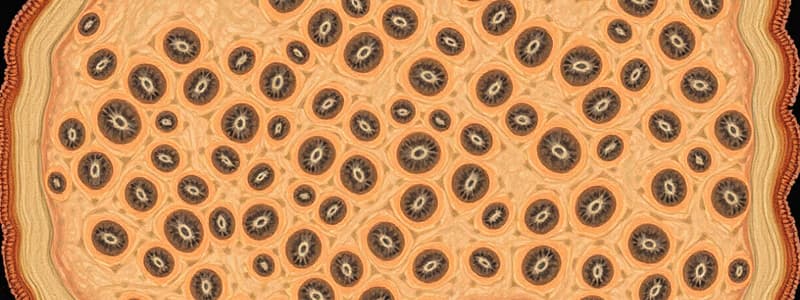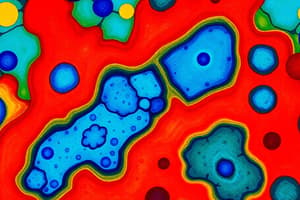Podcast
Questions and Answers
What is the primary function of osteocytes in the bone?
What is the primary function of osteocytes in the bone?
- To resorb bone during remodeling and healing
- To connect the vascular supply to the bone
- To maintain the bone matrix after becoming embedded (correct)
- To synthesize and secrete the osteoid matrix
Which features are unique to spongy bone compared to compact bone?
Which features are unique to spongy bone compared to compact bone?
- Consists of trabeculae surrounding red marrow filled spaces (correct)
- Contains a central canal with blood vessels
- Has a denser matrix than compact bone
- Contains osteons arranged in concentric lamellae
What connects the vascular supply of the periosteum to the central canal in bone?
What connects the vascular supply of the periosteum to the central canal in bone?
- Canaliculi
- Lacunae
- Perforating (Volkmann’s) canals (correct)
- Osteons
Which of the following statements about osteoblasts is correct?
Which of the following statements about osteoblasts is correct?
Where are osteocytes located within the bone structure?
Where are osteocytes located within the bone structure?
What type of cells are characteristic of the surface layer of the urinary tract?
What type of cells are characteristic of the surface layer of the urinary tract?
Which gland type lacks ducts and secretes directly into the blood?
Which gland type lacks ducts and secretes directly into the blood?
Which of the following statements about the mechanics of secretion is correct?
Which of the following statements about the mechanics of secretion is correct?
What is one of the primary functions of bone tissue?
What is one of the primary functions of bone tissue?
What type of secretory glands are goblet cells classified as?
What type of secretory glands are goblet cells classified as?
What structure in bone contains osteocytes?
What structure in bone contains osteocytes?
How is compact bone organized?
How is compact bone organized?
What do exocrine glands primarily discharge their secretions onto?
What do exocrine glands primarily discharge their secretions onto?
What type of cartilage is characterized by a matrix rich in elastic fibers?
What type of cartilage is characterized by a matrix rich in elastic fibers?
Which type of collagen is primarily found in hyaline cartilage?
Which type of collagen is primarily found in hyaline cartilage?
What is the primary function of fibrocartilage?
What is the primary function of fibrocartilage?
What is a characteristic of the matrix in elastic cartilage compared to other types?
What is a characteristic of the matrix in elastic cartilage compared to other types?
Which component is NOT found in the ground substance of cartilage?
Which component is NOT found in the ground substance of cartilage?
What is the primary role of chondroblasts in cartilage?
What is the primary role of chondroblasts in cartilage?
Which type of cartilage is found in the tracheal rings and nasal septum?
Which type of cartilage is found in the tracheal rings and nasal septum?
What type of cartilage has a basophilic ground substance?
What type of cartilage has a basophilic ground substance?
What is the primary function of simple squamous epithelium?
What is the primary function of simple squamous epithelium?
Which type of epithelial tissue consists of cells that appear to be layered but are all in contact with the basement membrane?
Which type of epithelial tissue consists of cells that appear to be layered but are all in contact with the basement membrane?
What characterizes simple cuboidal epithelium?
What characterizes simple cuboidal epithelium?
Where is stratified squamous epithelium commonly found?
Where is stratified squamous epithelium commonly found?
What is a distinguishing feature of transitional epithelium?
What is a distinguishing feature of transitional epithelium?
What type of epithelium is described as having flattened nuclei and aiding in gas exchange?
What type of epithelium is described as having flattened nuclei and aiding in gas exchange?
What is the primary characteristic of stratified cuboidal epithelium?
What is the primary characteristic of stratified cuboidal epithelium?
Which epithelium type is known for its ciliated cells that help move mucus in the respiratory tract?
Which epithelium type is known for its ciliated cells that help move mucus in the respiratory tract?
Flashcards
Squamous Epithelial Cell
Squamous Epithelial Cell
A thin, flat cell that is often found in areas where diffusion is important.
Cuboidal Epithelial Cell
Cuboidal Epithelial Cell
A cube-shaped cell with a rounded nucleus. It can be found in areas involved in secretion and absorption.
Columnar Epithelial Cell
Columnar Epithelial Cell
A tall, elongated cell with an oval nucleus. It can be found in areas involved in secretion and absorption.
Simple Epithelium
Simple Epithelium
Signup and view all the flashcards
Stratified Epithelium
Stratified Epithelium
Signup and view all the flashcards
Endothelium
Endothelium
Signup and view all the flashcards
Keratinized Stratified Squamous Epithelium
Keratinized Stratified Squamous Epithelium
Signup and view all the flashcards
Transitional Epithelium
Transitional Epithelium
Signup and view all the flashcards
What is an osteon?
What is an osteon?
Signup and view all the flashcards
What are osteocytes?
What are osteocytes?
Signup and view all the flashcards
What are perforating canals?
What are perforating canals?
Signup and view all the flashcards
What is spongy bone?
What is spongy bone?
Signup and view all the flashcards
What are osteoclasts?
What are osteoclasts?
Signup and view all the flashcards
Urothelium
Urothelium
Signup and view all the flashcards
Unicellular glands
Unicellular glands
Signup and view all the flashcards
Multicellular glands
Multicellular glands
Signup and view all the flashcards
Exocrine glands
Exocrine glands
Signup and view all the flashcards
Endocrine glands
Endocrine glands
Signup and view all the flashcards
Bone
Bone
Signup and view all the flashcards
Osteocytes
Osteocytes
Signup and view all the flashcards
Compact bone
Compact bone
Signup and view all the flashcards
Cartilage
Cartilage
Signup and view all the flashcards
Chondroblast
Chondroblast
Signup and view all the flashcards
Cartilage Matrix
Cartilage Matrix
Signup and view all the flashcards
Hyaline Cartilage
Hyaline Cartilage
Signup and view all the flashcards
Elastic Cartilage
Elastic Cartilage
Signup and view all the flashcards
Fibrocartilage
Fibrocartilage
Signup and view all the flashcards
Perichondrium
Perichondrium
Signup and view all the flashcards
Lacunae
Lacunae
Signup and view all the flashcards
Study Notes
Tissues
- Tissues are groups of cells that work together to perform specific functions.
- Epithelial tissue covers the external surface or lines the interior of organs and body cavities.
- Epithelial tissues are classified based on cell shape and layers.
- Shape classifications include squamous (flat and thin), cuboidal (cube-shaped), and columnar (tall and elongated).
- Number classifications include simple (single layer) and stratified (two or more layers).
- Simple squamous epithelium: thin, flat cells that facilitate diffusion of gases and nutrients. Found in blood vessels, mesothelium, and alveoli.
- Simple cuboidal epithelium: cells are cube-shaped and have a round nucleus. Found in the covering of ovaries, lining of ducts, and thyroid follicles.
- Simple columnar epithelium: cells are tall and elongated, with an oval nucleus. Found in secretory glands, like the goblet cells, and absorptive surfaces with microvilli or cilia.
- Pseudostratified ciliated columnar epithelium: appears layered but is a single layer, with nuclei at different levels. Found in the respiratory tract.
- Stratified squamous epithelium: multiple layers of cells. Basal cells are active and columnar, intermediate layers are polygonal, and surface cells are flattened squamous. Located where there is wear and tear, such as oral cavity, skin and vagina. Keratinized has surface cells that lose their nuclei and are replaced by keratin.
- Transitional epithelium: multiple layers of cells; basal cells are low columnar, intermediate layers are polygonal, and surface cells are large and rounded (like umbrellas). Found in the urinary tract (urothelium). It is capable of distention.
- Glands can be unicellular (e.g., goblet cells) or multicellular (e.g., salivary glands).
- Secretion can be discharged directly or through a duct system.
- Mechanisms of gland secretion include merocrine (by exocytosis), apocrine (loss of apical parts of epithelial cells), and holocrine (whole cell rupture).
Bone
- Bone is one of the hardest substances in the body, a living tissue composed of cells, fibers, and extracellular matrix.
- Hard, calcified matrix with collagen fibers is found in bone.
- Calcium salts are deposited in the ground substance.
- Osteocytes are found in lacunae and are well-vascularized.
- Bone supports, protects, provides levers for muscular action, and stores calcium and phosphorus minerals.
- Red marrow inside bones is the site of hematopoiesis.
- Bone is organized into units called osteons or Haversian systems.
- Osteons consist of concentric lamellae surrounding a central canal containing blood vessels, nerves, and loose connective tissue.
- Osteocytes are found in spaces called lacunae.
- Perforating (Volkmann's) canals connect the vascular supply of the periosteum to that of the central canal and medullary cavity.
- Spongy bone does not contain osteons; it consists of trabeculae surrounding many red marrow-filled spaces and forms most of the structure of short, flat, and irregular bones and the epiphyses of long bones.
Cartilage
- Cartilage is modified connective tissue that forms the skeletal basis of some body parts.
- Cartilage matrix is firm and provides characteristic consistency.
- Cartilage is mostly avascular. Nutrients diffuse from the perichondrium, a rich source of blood vessels.
- The three types of cartilage are hyaline, elastic, and fibrous.
Bone cell Types
- Osteoblasts are immature bone cells that synthesize and secrete the osteoid matrix (uncalcified extracellular matrix).
- Osteocytes are mature bone cells embedded within calcified bone matrix and reside in lacunae. They are connected to neighboring osteocytes via cytoplasmic processes through small tunnels called canaliculi.
- Osteoclasts are large, multinucleated cells that act to resorb bone during formation. They are important in maintaining calcium.
Studying That Suits You
Use AI to generate personalized quizzes and flashcards to suit your learning preferences.




